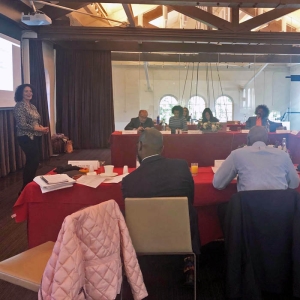USC Symposium Explores Racism in New Media
April 01, 2019 / by Catalina Vazquez- Research
What do forgiveness, “fake news,” and Black Twitter have in common?
According to researchers, the answer is racism.
The Race Symposium, an annual event jointly held by Cherrie Short, associate dean of global and community initiatives at the USC Suzanne Dworak-Peck School of Social Work, and John L. Jackson Jr., dean of the Annenberg School for Communication at the University of Pennsylvania, invited scholars from all over the United States to USC to explore new attitudes, opportunities and challenges for people of color in contemporary America to advance research in this area.
“Race research that delves into issues of inequality is important for social progress, as it informs policies that directly impact the lives of all U.S. inhabitants,” Short said. “My goal for the symposium is to create a space in which race scholars gather and exchange information that is vital to their teaching and research.”
Jackson reinforced the idea of focusing on the practical aspects of the symposium’s discussions.
“Today is not about intellectual performances but real people coming together to figure out issues [of race and racism],” said Jackson during the opening session of the 3rd annual symposium held March 11-12. “We imagine ourselves to be more expert in it than we are.”
The event was attended by faculty from several disciplines and universities from across the country, including Northeastern University and the University of Missouri. Devin Fergus, professor of history and black studies at the University of Missouri joined the group from the United Kingdom, where he is currently gathering data related to racism, new media and Brexit. He also presented data on fake news that targeted black and brown votes during the 2016 U.S. elections. Fergus provided examples from an organization that disseminated false information via online marketing campaigns, advising working class brown and black voters to vote a certain way or tricking them into not voting altogether by sending texts to Latino voters stating that they can vote via text to avoid long trips to the polls.
“Targeting had more to do with race than a state’s role in the Electoral College or status as a swing state,” Fergus said, “as they were seen as critical spaces to create social division.”
The conversation continued with research presented by Sharrona Pearl, dean’s fellow at the University of Pennsylvania Annenberg School for Communication, and Sarah Jackson, associate professor at Northeastern University College of Arts, Media and Design.
Pearl discussed the power dynamics that happen when reporters publicly ask families of young black male victims to forgive the officers who shot them. The ritual, as Pearl called it, can inadvertently release the officers and police departments from any accountability, which is especially troubling in race-related trends in police shootings.
“It’s one thing to forgive someone for your own sake,” said LaVonna Lewis, teaching professor at the USC Sol Price School of Public Policy. “It’s an entirely different thing to think about systems that lock [officers] into breaking law.”
Trevor Phillips, a television producer from the U.K., added that ultimately society has to be careful not to “revictimize” people by pressuring them or questioning them about forgiveness.
When the group shifted gears to discuss Black Twitter, the conversation centered on the appropriation of #mynypd, a campaign initially started by the New York Police Department in 2014 to generate positive Twitter content about the police force. Instead, people of color, mainly African American youth, used the hashtag along with quotes, pictures and videos that pointed toward police brutality, hijacking the hashtag. Ultimately, the trend led to creating a counter discourse to mainstream ideas about black Americans, and identified troubling systems of oppression.
“Telling our own stories is a key part of racial liberation efforts,” Sarah Jackson said.
The dynamics of dismantling racism
Since the first Race Symposium was held in the spring of 2017, the researchers have shifted from discussing diversity in academia to identifying specific tools that can be used in their teaching and research to dismantle racism.
“This material is a discovery to lead you somewhere in the end,” said Terence Fitzgerald, clinical associate professor at the USC Suzanne Dworak-Peck School of Social Work. He and Assistant Professor B.K. Elizabeth Kim co-facilitated the afternoon discussion about next steps.
“I’ve really enjoyed today. It has pushed my thinking in a lot of ways. I want to go deeper. I want more,” said Lucy Williams, professor of law at Northeastern University. “I’ve been trying to change the narrative for more than 40 years.”
Short echoed the sentiment of wanting to further the conversation.
“The point is to take these understandings that we’ve developed as a group, and take it into the classrooms and spaces where we encounter people who don’t think about race, or who think we’ve done enough on racism,” she said.
Looking ahead
Short and John L. Jackson Jr. plan to create a journal that will highlight the key outcomes of the three symposiums. The journal will include important outcomes, as well as a selection of academic articles that were presented during the three sessions.
“The goal has always centered on bridging disciplinary divides to forge a cohesive conversation about contemporary racism in America,” Short said. “This journal will keep that conversation going by highlighting key findings from the people doing the work on this issue, day in and day out.”
To reference the work of our faculty online, we ask that you directly quote their work where possible and attribute it to "FACULTY NAME, a professor in the USC Suzanne Dworak-Peck School of Social Work” (LINK: https://dworakpeck.usc.edu)
